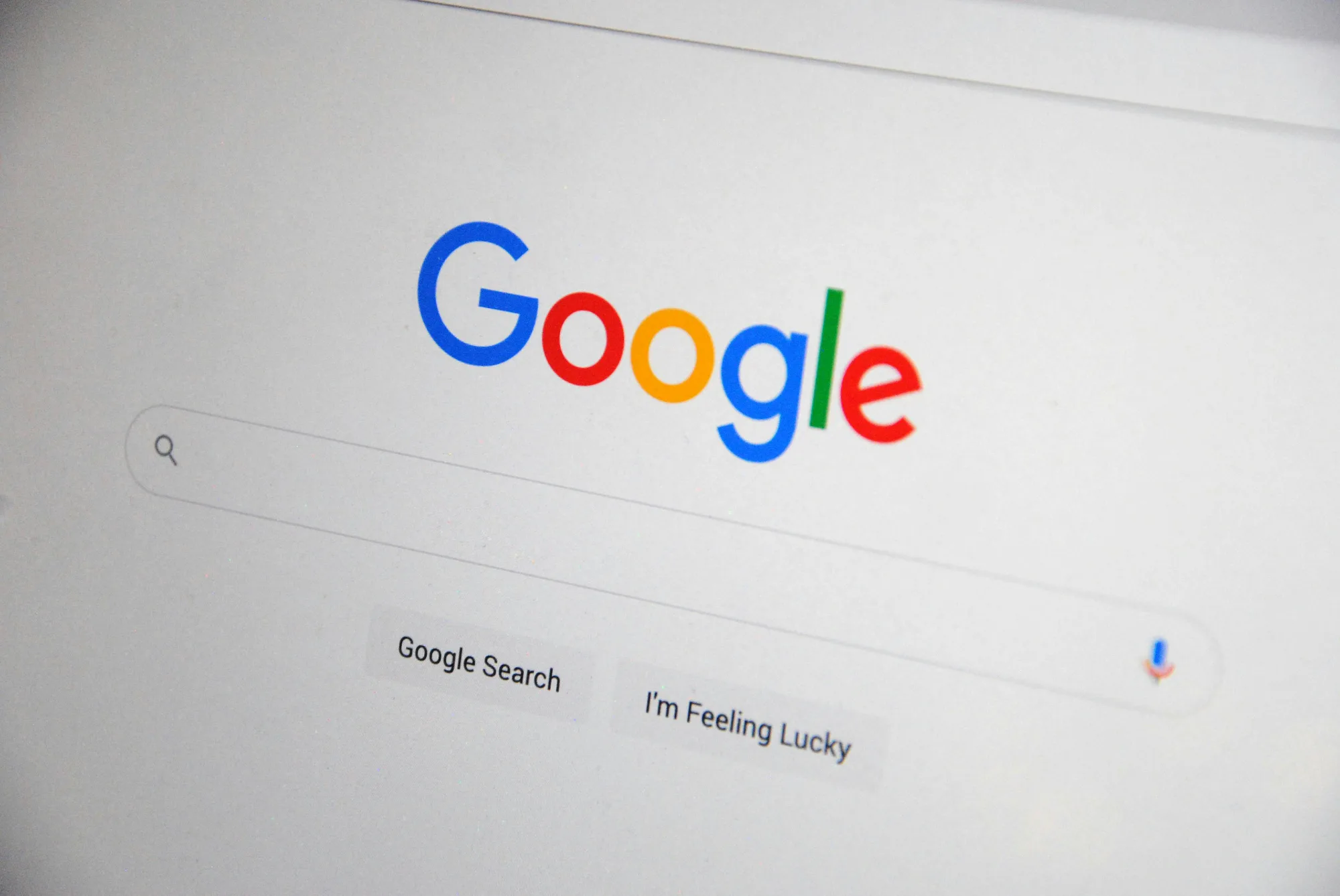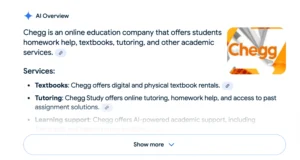Chegg vs. Google: Antitrust Battle Over AI-Powered Search Disruption
On February 24, 2025, online education company Chegg filed a federal antitrust lawsuit against Google, claiming that its AI-generated summaries, known as “AI Overviews,” (AIO) have drastically cut traffic to Chegg’s website, leading to revenue losses and workforce reductions. Just in case you don’t know who Chegg or AI Overviews I’ll provide a photo.
What to Know About the Lawsuit
- What Chegg Alleges Google is Doing: Chegg accuses Google of leveraging its AI Overviews to pull information from third-party websites, including Chegg, and display it directly in search results. This, according to Chegg, reduces the need for users to visit the original source, ultimately cutting into the company’s web traffic.
- Impact on Chegg: Chegg states that its non-subscriber traffic dropped by 49% in January 2025 compared to the previous year. This decline has coincided with a nearly 90% decrease in the company’s stock value over the past year. This is likely a result of AIO’s providing users the information they’re looking for without having to leave Google’s SERP (aka Zero-click searches, essentially user searches where the user does not click through to any site). It’s important to note, other businesses have reported losses due to AIO and Google Algorithm updates.
- Legal Basis: Chegg’s lawsuit argues that Google is violating the Sherman Antitrust Act by maintaining an unfair monopoly. The company claims Google is exploiting its proprietary content without compensation, harming competition in the online education market. Since Google’s inception (and the rise of search engines), companies have alleged Google profits from their content without proper compensation.
- Google’s Response: Since the inception of AI Overviews, Google has defended AIO’s in search results, saying they improve search functionality and help drive traffic to a wider range of websites. The company dismissed Chegg’s allegations as unfounded.
Chegg’s Strategic Review: In light of these challenges, Chegg is exploring strategic alternatives, including a potential sale or going private. (Reuters) - Chegg to Conduct a Business Review: Facing declining traffic and financial setbacks, Chegg is evaluating various strategic options, which may include selling the company or transitioning to a private entity.
Chegg’s lawsuit reflects the giant battle and qualms content creators have always had with search platforms (namely Google & YouTube). The conflict has reached a boiling point in the era of AI-generated content, and does raise concerns about its impact on website traffic, revenue, and the broader digital ecosystem. I’ve long stated, that it’s very hard to work against Google (or search engines) and be successful. After all, organic search is usually most websites’ largest traffic channel. However, that’s not synonymous with me saying I agree with search engines getting to use our content without any sort of compensation. Where do you stand in this debate? Share this article to LinkedIn and tag us (@DRVNMedia) to keep the conversation going.
What Makes Chegg’s Lawsuit Different
Anyone who creates content knows Google has the upside. While it’s not entirely one-sided, Google is heavily favored in the equation, and it’s not even freaking close. After all, our content is what populates their search engine, and ad-spots. However, the part Chegg is suing Google for isn’t even the unfair usage of content they don’t own, and it’s for the abuse of their monopoly power. Now, I’m not an attorney – so I can’t provide any unique legal perspectives on this case. In fact, it would be very irresponsible for me to speak on whether or not this case has merit. However, what I do know is, Chegg enlisted the help of the Susman Godfrey Law Firm. Again, I’m not even in the legal field and even I’ve heard that name, but just in case you haven’t they’re not only known for their ability to win, but to also win big. Since I do a lot of my B2B marketing on LinkedIn, I also used my premium account superpowers to send Devin Stone a message. Just in case you don’t recognize that name, he’s an Adjunct Professor of Law at Georgetown University, runs a law firm, and has a popular YouTube Channel called LegalEagle where he explains legal cases in a very entertaining way. But for the bad news – I haven’t gotten a response yet, so no promises on a YouTube video from him regarding this.
Why is This Lawsuit Versus Google Important
Here’s my opinion, and again, I’m not a lawyer… But if Chegg were to win its lawsuit against Google, it could set a significant precedent for how AI-generated content is handled in search results, which could also set precedent for how AI Search Engines work, and potentially reshape the digital landscape for content creators. But don’t hold you breath on the last part. Here’s what a victory might mean:
- A ruling in Chegg’s favor could force Google to either revise or limit how AI Overviews pull and display information from third-party sites. Google might be required to provide clearer attribution, compensate content providers, or even restrict AI-generated summaries in a way that ensures users still visit original sources.
- A win for the little guys could embolden other publishers, education platforms, and media companies to challenge Google and other tech giants over AI content scraping. This could lead to broader regulatory oversight, forcing search engines to prioritize organic traffic to original sources rather than summarizing content within search results. After all, any of us who offer client services in SEO have seen the impact of AIO’s in one way or another on client sites.
- Chegg winning could strengthen the argument that Google’s search dominance creates an unfair competitive advantage by favoring its own AI-generated content over external publishers. This could invite further scrutiny from regulators and possibly lead to additional restrictions or oversight of Google’s search practices. I mean they already lost 1 lawsuit recently regarding their search monopoly…
If Chegg wins, I personally don’t see the DOJ under this administration going after Google with even more lawsuits, why? Because this administration wants to give the appearance of “Pro-Business,” and I think hitting Google with another lawsuit says the opposite of that. However, this borders on political talk so I’ll stop there. But we’re headed into a new era, and perhaps what we do need is some legislation that regulates how AI-generated responses, and AI search results can be used so it doesn’t impact other businesses. By market cap, Google is in the top 5 largest companies in the world, so do they really need anymore upside? I’m also okay with revenue sharing models. I don’t know how one would work, but maybe Andrew Yang was onto something when he said it’s our data (or content), shouldn’t we be compensated when another entity is making a profit off of our property? I would say so.
Challenges Chegg Faces in Winning
This is by no means an open and shut case. In Chegg versus Goliath, I mean Google… Chegg would need to prove Google’s practices directly harm fair competition under antitrust law, not just the fact that Google’s AI Overviews negatively impacted Chegg’s business. Additionally, from what I remember in a college elective course 20+ years ago is sheep vs. wolf – basically, courts often rule in favor of protecting the consumer benefits. Before you say, “YES – Google hurt Chegg’s business they must go down…” How I interpret that is Google just has to make a convincing argument about how AI Overviews enhance user experience, allowing them to get to the answers and products they want to buy easier rather than stifling competition. Again, I’m not a lawyer, but that’s my interpretation of it. Ultimately, a win for Chegg could redefine the boundaries of fair competition in the AI-driven search frontier, and it could result in legislation that forces these tech giants to work within some confines that’s a little more equitable for everyone who relies on search engine traffic from the likes of Google (or whichever ones may come in the future,) for the success of their business. I repeat, Google is the 5th largest company in the world, so shouldn’t they have a responsibility to make business decisions with everyone in mind, and not just themselves? I’m guessing it’s gonna be a while before this one plays out.
Sources:
- https://www.reuters.com/legal/googles-ai-previews-erode-internet-edtech-company-says-lawsuit-2025-02-24/
- https://www.theverge.com/news/619051/chegg-google-ai-overviews-monopoly
- https://searchengineland.com/google-sued-by-chegg-over-ai-overviews-hurting-traffic-and-revenue-452518
Hot Take: I despise content that’s hidden behind a paywall, and think those results on Google Search contributes to a poor user experience on Google too – so why don’t they do something about that haha. The above links should be free to read without subscriptions, and/or paywalls.
Author Bio:
Vinh Huynh is Digital Marketing strategist, specializing in SEO & Paid Search, and also the owner of DRVN. He helps businesses improve their online visibility, through data-driven strategies. Outside of Digital Marketing, you can find him coaching the sport of Olympic Weightlifting, and networking with entrepreneurs, and local businesses.


